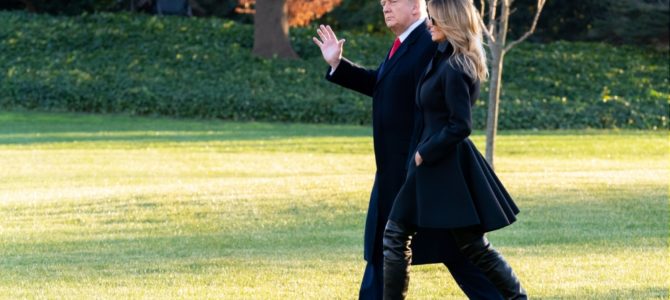
At the end of his second term, amid the early retrospectives about his presidency, George W. Bush reportedly remarked, “the true history of my administration will be written 50 years from now.” It was a wise reminder that the passage of time generally yields a more honest, dispassionate analysis of events than is often allowed by the heated political present.
While we are left to wonder how history will judge the last four years of President Trump, it will hopefully be with more fairness than the often-unhinged levels of coverage he’s received to date. Yet as the nation’s self-appointed purveyors of truth dutifully tap out their think pieces about how Trump brought fascism to America, it’s worth reflecting on what changes Trump did bring to Washington.
Trump Engaged on Policy Literally, Not Rhetorically
I have worked in and around Republican politics in Washington for nearly 15 years observing Republicans of all stripes. Trump is different. What is most notable, however, is how he is different, and what he accomplished because of it.
To put it frankly, Trump dared to meaningfully go where nearly every Republican politician in my lifetime has feared to tread: culture. For instance, Trump, with his typical rhetorical flourish, refers to his administration as the most pro-life administration in history. He’s not too far off the mark.
After years of empty rhetoric from Republican politicians, Trump shepherded more substantive gains for the pro-life movement than nearly every president before him and certainly every Congress: ending federal funding for new medical research using fetal tissue from aborted babies; giving states the ability to exclude abortion providers from their federally supported Medicaid programs; and prohibiting federal family planning dollars from flowing to organizations that “perform, promote, or refer for abortion,” a move that resulted in Planned Parenthood — the nation’s largest abortion provider — rejecting the funds altogether.
Trump wasn’t a pick-and-choose culture warrior, however. Perhaps one of the most striking things about his presidency was how willingly he showed up to the culture war, something the Republican base has been begging their leaders to do for years, to no avail. Conservatives, in particular, have felt under attack from every significant culture-shaping institution: public schools and universities, Hollywood, the media, Silicon Valley, Wall Street, and major corporations.
Rather than shirking from these fights with limp excuses about “leaving private business alone,” or encouraging people to “build your own Facebook,” Trump recognized these institutions have grown powerful on the largesse of government policy as well as on dollars from the taxpayers they now want to banish from polite society. He didn’t give an inch.
Perhaps Trump intuitively understood the stakes that Andrew Breitbart so keenly laid out years before — that politics is downstream from culture. Or perhaps he bristled at the various ways corporate media characterized him and his voters as dumb, ignorant, racist rubes.
Regardless of the reason, Trump waded right into the Woke Wars, defending statues as important to the lessons of America’s history, threatening the government subsidies that have built the billion-dollar tech companies now tyrannizing the free flow of information, taking on the insidious racism of critical race theory in the government, and decrying the intellectual authoritarianism — and, increasingly actual authoritarianism — of the left.
He was unafraid to talk in plain terms about the economic trade-offs we make for a loose immigration policy that prioritizes cheap labor. Furthermore, his subsequent gains with Hispanic voters in the 2020 election proved a huge part of the GOP consultant class wrong regarding the “right” kind of Republican immigration policy. Also, after years of Washington acceding to corporations who deferred to China, Trump rightly identified the country as our chief geopolitical and economic adversary and wasn’t afraid to shout it.
Where many on the right have no answer to the growing culture of wokeness and the mega-political power wielded against policy outcomes by corporate institutions, Trump engaged in the fight. Yes, he was sometimes inartful, and sometimes inelegant, but he refused to waver. Frequently, he distinguished himself from the ranks of Republican politicians who consistently feign helplessness, or, worse, continue to crave approval from corporate titans and Hollywood superstars who hate them.
Trump Revealed the ‘Swamp’ Is Real
If Trump’s actions were clarifying in their sharp contrast to decades of Republican rule, the response to him by greater Washington was even more so. Trump’s tenure proved that the swamp is real and that the creatures that dwell in it have teeth.
Under Trump, bureaucrats were no longer faceless drones whose influence was rumored but never proven. They were real, with names, faces, and overt political agendas, like Alexander Vindman, Sally Yates, James Mattis, Kevin Clinesmith, James Comey, Lisa Page, and Peter Strzok.
A junior-level staffer at the Department of Homeland Security was allowed to publish anonymously in The New York Times, his bio and influence inflated because he was denouncing the president. A retiring diplomat bragged about keeping the president intentionally misinformed so he could not withdraw American troops from Syria.
Trump’s time in office made it finally, painfully, obvious how much power unelected officials have in Washington, and, more dangerously, how much they see their positions not in service to our representative self-government, but as a perch from which to rule. They were aided by a relentless media campaign that sought to turn insubordination — and even outright illegality — into stardom, cable news contracts, and book deals.
The swamp, we learned, is not so much an immovable block as it is a multi-headed hydra, working across agencies and industries to strangle the town to its will. But where it once existed in the shadows, institutional Washington’s response to Trump has exposed itself fully in the full, harsh light of day.
Early in his tenure, Senate Majority Leader Mitch McConnell told Trump that he “didn’t want to hear any of this drain the swamp talk.” Democrat legislators claim working-class credentials while defending the corporate oligarchy of the Big Tech companies because Big Tech favors them. An entire flank of people who once associated with the Republican party has left it, either officially or rhetorically, many of them now openly favoring Democrats.
For everything Trump gave us — the good, the bad, the hilarious, and the unsettling — his administration brought much-needed clarity to the GOP and the country.
Washington, D.C, is a town built on petty agendas, political calculations, and superficial promises. It’s a teetering game of Jenga, with each politician trying his best to place his block on the tower. To successfully maneuver in this city requires finesse, a highly trained ability to ignore the inconvenient, a penchant for back-slapping, and a precise sense of timing.
But there is an alternative. As the voters who sent Trump to Washington seemed to grasp intuitively, D.C can be tamed — or at least threatened — by someone willing to bring in a battering ram and knock the whole thing over, to be built anew on sounder foundations.
Trump ultimately seemed to see his election as more of a moment than as the beginning of a movement. Despite this — and although many will attempt to erase it — his four years have left an indelible mark on this city, on the path that Republicans may follow, and on what voters will expect from their leaders going forward. What has been demonstrated as possible, exposed as disingenuous, and unmasked as baselessly corrupt can’t easily be unseen.








